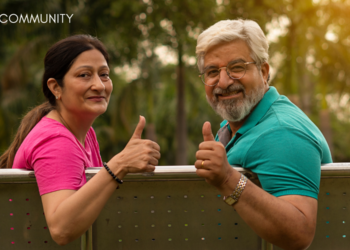Alzheimer’s disease and dementia. Some people are confused about these terms and use them interchangeably. So, do dementia and Alzheimer’s refer to the same thing and if not, what is the difference? Most people relate these terms to a general decline in cognitive abilities, especially memory loss, which is partially correct.
A recent study concluded that the prevalence of dementia in India could be 8.44% in people over 60 years. That makes it more than 10 million cases approximately. What’s worrying is that many studies have predicted that this percentage can increase significantly over the next three decades. Let’s delve a little deeper to understand better.

Join Now >
Understanding dementia
Dementia is not a disease but rather a syndrome. It is an umbrella medical term used to refer to a set of symptoms that affect people’s ability to perform everyday tasks. These symptoms also impact the memory and communication abilities of people. Alzheimer’s disease is the most common form of dementia, the connection between the two terms. The risk of developing dementia is high for people above 65. However, it does not necessarily mean it is part of ageing. At times, younger people get affected by dementia. As the condition progresses, it can significantly impact the ability of people to function independently. What are the symptoms?
Symptoms
- Forgetfulness
- Losing track of time and place
- Decreased focus
- Confusion (repeated questioning)
- Poor hygiene
- Inability to take care of self
- Inability to remember people and faces
- Behaviour changes
- Depression
- Aggression
Most symptoms appear progressively, and there is a chance people mistake it for a natural part of ageing. Alzheimer’s disease accounts for 60 to 80% of dementia. Also, look out for these early warning signs.
Types of dementia
Dementia is of various types based on the causes, such as:
- Vascular dementia – caused by blockage of blood flow to the brain
- Lewy body dementia (LBD) – caused by protein deposits in the brain that interrupt electric signals
- Parkinson’s disease dementia – decline in cognitive capabilities brought on by Parkinson’s
- Frontotemporal dementia – loss of brain functions in the region near the forehead and behind your ears
- Posterior cortical atrophy – deterioration of the outer layer of the brain called the cortex
- Creutzfeldt-Jakob disease – a rare infectious causing rapidly progressive dementia
- Wernicke-Korsakoff syndrome – a brain disorder caused by lack of Vitamin B1
- Normal pressure hydrocephalus – build-up of fluid in the brain ventricles
- Huntington’s disease – break down of nerve cells in the brain
Treatment
The treatment of dementia depends on the underlying cause and disease, if any. It is not reversible, but you can manage the symptoms through treatment. Dementia caused by drugs, tumours, metabolic disorders, hypoglycaemia, etc., responds to treatment.
What is Alzheimer’s disease?
As mentioned above, Alzheimer’s is a progressive disease that impairs people’s memory and cognitive capabilities. There is no specific cause or cure for this disease. As such, we can only work towards managing the disease and its symptoms. While younger people also get Alzheimer’s disease, most people who develop symptoms are above 65 years.
Symptoms
Most of the symptoms mentioned above for dementia may occur in Alzheimer’s disease. People with advanced Alzheimer’s disease may have difficulty speaking, swallowing and walking. People with LBD may have visual hallucinations, balance issues and sleep disturbances. Those having Parkinson’s or Huntington’s disease will likely experience involuntary movements also.
Treatment
The treatment options here include medications for:
- Behavioural changes
- Memory loss
- Sleep changes
- Depression
Healthcare professionals also explore alternative therapies to boost brain functions for improved quality of life for patients. Some examples are cognitive stimulation therapy, cognitive rehabilitation, reminiscing life stories and events, etc.
Looking into the future
There is no sure-shot way to prevent Alzheimer’s. However, some tips can always help reduce the risk. In a recent Times of India article, Dr. Suvarna Alladi, Professor and Head of neurology, NIMHANS Bangalore mentioned that you if you speak two languages, you can delay dementia by five years!
Here are some other points you can consider to keep it at bay.
- Physical exercise
- Social engagement
- Hobbies
- Healthy diet
- Mental stimulation
- Quality sleep
- Stress management
- Vascular health
- Diabetes and blood pressure management
Since most of these points are what we urge seniors, in general, for an overall healthy and active life, it is not troublesome to follow. Watch out for our article on diet options specifically intended to reduce the risk of Alzheimer’s.









